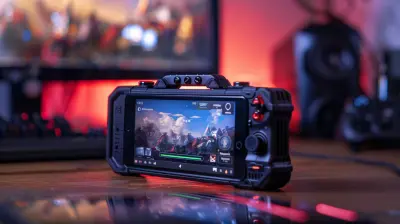Why Gamers Make Great Problem Solvers
21 September 2025
Ever wondered why your gamer friend seems to handle real-world chaos like a boss? Or why that quiet co-worker who spends weekends glued to their console is uncannily calm during a crisis? Well, it’s not just coincidence or caffeine – it turns out gamers are wired to be amazing problem solvers. Let’s deep-dive into how leveling up in the digital world helps level up real-life thinking.

Gaming Is More Than Just Fun – It’s Brain Gym
Video games get a bad rap sometimes. People often only see the flashy battles, pixelated zombies, and marathon gaming sessions. But behind those screens, something incredible is happening – our brains are getting a solid workout.When you play games, you’re not just pushing buttons. You’re constantly analyzing, adapting, predicting outcomes, managing resources, and making lightning-fast decisions. Games are essentially complex puzzles wrapped in fun.
Whether it’s navigating through a tricky dungeon in Zelda or crafting the perfect survival strategy in Minecraft, gamers are developing key cognitive skills that naturally spill over into real-life problem solving.

The Puzzle-Solving Power of Gamers
Let’s be honest – have you ever seen a gamer give up after one failed attempt? Nope. That retry button gets hit faster than you can say “Game Over.”Gamers are incredibly persistent. They try, fail, adapt, and try again. This “trial and error” mindset is the cornerstone of great problem solving. In the real world, challenges don’t always come with a walkthrough guide, but gamers are used to that. They’re not afraid to test different approaches, find creative solutions, and keep pushing through obstacles.
It’s like building IKEA furniture without instructions – but instead of panicking, a gamer would grab a soda, throw on some music, and figure it out one screw at a time.

Pattern Recognition? Gamers Have That On Lock
In most games, spotting patterns is the key to success. Think about Dark Souls or Hollow Knight. Those epic boss fights? They’re not random. Each enemy has a rhythm – an attack pattern that, once deciphered, gives you the upper hand.Gamers learn to observe, recognize patterns, and anticipate the next move. This ability can be incredibly useful in real life – whether you’re troubleshooting a faulty gadget, tackling a tricky math problem, or even managing a team at work.
When you can identify patterns, you can predict outcomes. That’s not just smart gaming – that’s strategic thinking.

Strategic Thinking and Planning 101
Many games are built on complex strategy. In real-time strategy (RTS) games like StarCraft or Age of Empires, players must manage time, predict opponent movements, optimize resources, and plan several steps ahead.Sounds a lot like running a business, doesn’t it?
Whether it’s planning the next move in Civilization VI or setting traps in Among Us, gamers are constantly thinking ahead. They weigh risks, consider consequences, and choose the best path forward—essential life skills in disguise.
Multitasking Like a Pro
Ever watched a League of Legends pro play? It’s like watching a DJ spin ten different tracks with one hand while making lunch with the other.Gamers juggle a ton of tasks simultaneously – movement, map awareness, managing cooldowns, tracking enemy positions, and communicating with teammates. It’s high-octane multitasking, and it seriously sharpens the brain.
In the workplace, this translates into being able to handle tight deadlines, manage multiple projects, and stay cool under pressure. Gamers don’t just live in chaos – they thrive in it.
Adaptability: When the Game Throws Curveballs
Games love to surprise us. A boss fight suddenly changes phase. A stealth mission goes loud. Your carefully built base in Rust gets raided at 3AM by a squad of sleep-deprived trolls.Gamers are used to adapting on the fly. When things don’t go as planned, they don’t freeze – they improvise. This skill is golden in today’s ever-changing world. Whether it’s shifting workplace dynamics, sudden changes in a project, or dealing with unexpected personal challenges, gamers are quick to realign and readjust.
Because if you can survive a surprise betrayal in Among Us, you can survive anything.
Lateral Thinking FTW (For The Win)
Some games don’t give you straight answers. Think Portal, The Witness, or Baba is You. These titles force players to think outside the box—or in the case of Portal, through the box!Lateral thinking means approaching a problem from a unique angle. Instead of doing what everyone else is doing, a gamer might zig when others zag. That kind of creative thinking is invaluable in the workplace, education, or even daily life.
The ability to see multiple solutions to a problem, instead of getting stuck in a single mindset, puts gamers ahead of the curve.
Communication and Teamwork: Not Just Button Mashing
If you think all gamers are lone wolves, think again. Multiplayer games demand serious communication skills. In games like Overwatch, Fortnite, or Valorant, teammates need to coordinate, call out enemy positions, strategize, and support one another.Clear communication, constructive feedback, and active collaboration are core components of team games—and these are the same skills needed for working on group projects, leading teams, or navigating relationships.
Plus, there’s something magical about yelling “He’s flanking left!” into your mic and watching your team immediately respond like a well-oiled machine.
Gamers Handle Failure Like Champs
Let’s face it—most games are designed to make you fail. Over and over. And over. But instead of throwing the controller (okay, maybe sometimes), gamers usually respawn, regroup, and try again.This resilience is HUGE. In life, failure is inevitable. What matters is how you bounce back. Gamers have the epic ability to turn failures into feedback. They learn, adjust, and grow. That’s the heart of problem-solving.
Failure isn’t an end. For gamers, it’s just a checkpoint before the win.
Gamification: Turning Mundane Problems into Fun Missions
Something fascinating happens when gamers face real-world problems—they often turn them into “quests.”Need to clean your apartment? Break it down into objectives like a fetch quest. Got a tough project? Treat it like building your base in SimCity.
By reframing problems as games, gamers stay engaged and motivated. It’s a mindset that transforms boring tasks into fun challenges, making problems feel conquerable instead of crushing.
Reflection and Post-Game Analysis
Gamers don’t just move on after a loss—they review the play. “Why did we lose?” “What went wrong with that strategy?” “Should I have flanked instead of rushing in?”This analytical mindset helps players improve—and it mirrors what top performers do in any field. Athletes watch game footage. Entrepreneurs study failed startups. Gamers? They watch replays and swap tactics in forums.
Gamers instinctively step back, evaluate their choices, and figure out what to do better next time—a priceless trait for solving real-world problems.
Emotional Regulation in High-Stress Moments
Let’s not forget emotional intelligence. Whether they’re facing a toxic teammate or surviving a last-man-standing moment in PUBG, gamers learn to stay cool under pressure.Because making a split-second decision with your heart racing is something gamers do daily. Staying laser-focused in the heat of the moment, managing emotions, and bouncing back from setbacks? That’s emotional regulation in action—and one more reason gamers shine as problem solvers.
The Science Backs It Up
If you're thinking, "This sounds awesome, but is it just hype?"—nope! Studies show that regular gaming can improve cognitive flexibility, decision-making, spatial reasoning, and pattern recognition. Some researchers even suggest that gamers make faster and more accurate decisions than non-gamers.So next time someone tells you that video games rot your brain, feel free to laugh and flex your problem-solving skills.
Final Thoughts: There's a Gamer Brain Behind Every Solution
Let’s wrap it up with this: being a gamer isn’t just about having fun (though that’s a big part of it). It’s about building a brain that handles chaos, adapts quickly, communicates efficiently, learns from failure, and solves problems like a pro.Whether you're navigating through a tough level in Elden Ring or figuring out how to fix your internet after a storm, your gaming experience gives you a secret edge.
So, if you're a gamer reading this—high five! And if you’re not, maybe it’s time to pick up that controller. You never know when that next level-up will change how you approach the world.
Game on, problem-solvers.
all images in this post were generated using AI tools
Category:
Gamer LifestyleAuthor:

Brianna Reyes
Discussion
rate this article
1 comments
Solstice McLain
Fascinating perspective! It's intriguing how gaming cultivates creativity and critical thinking—skills that transcend virtual worlds into real-life challenges.
September 27, 2025 at 4:20 PM

Brianna Reyes
Thank you! I'm glad you found it intriguing—gaming truly does enhance valuable skills that apply beyond the screen.


